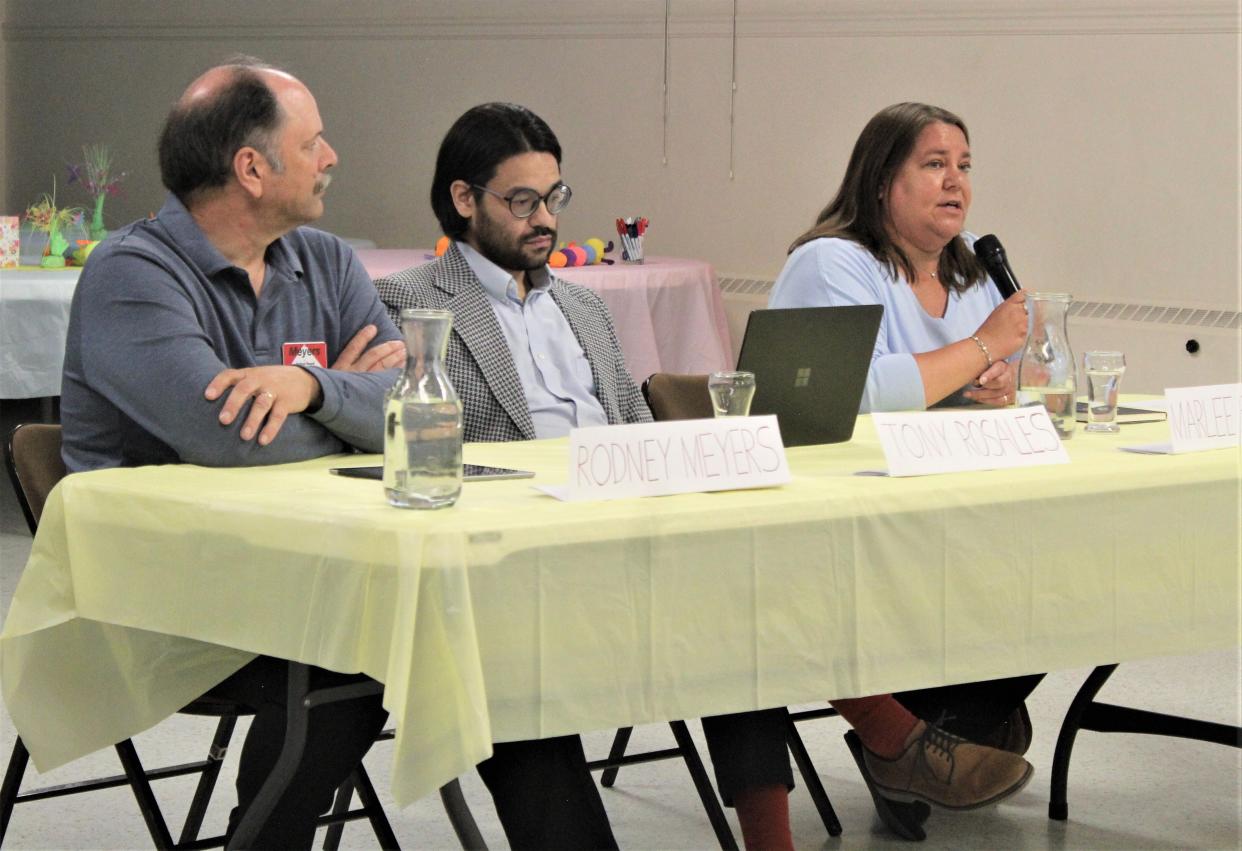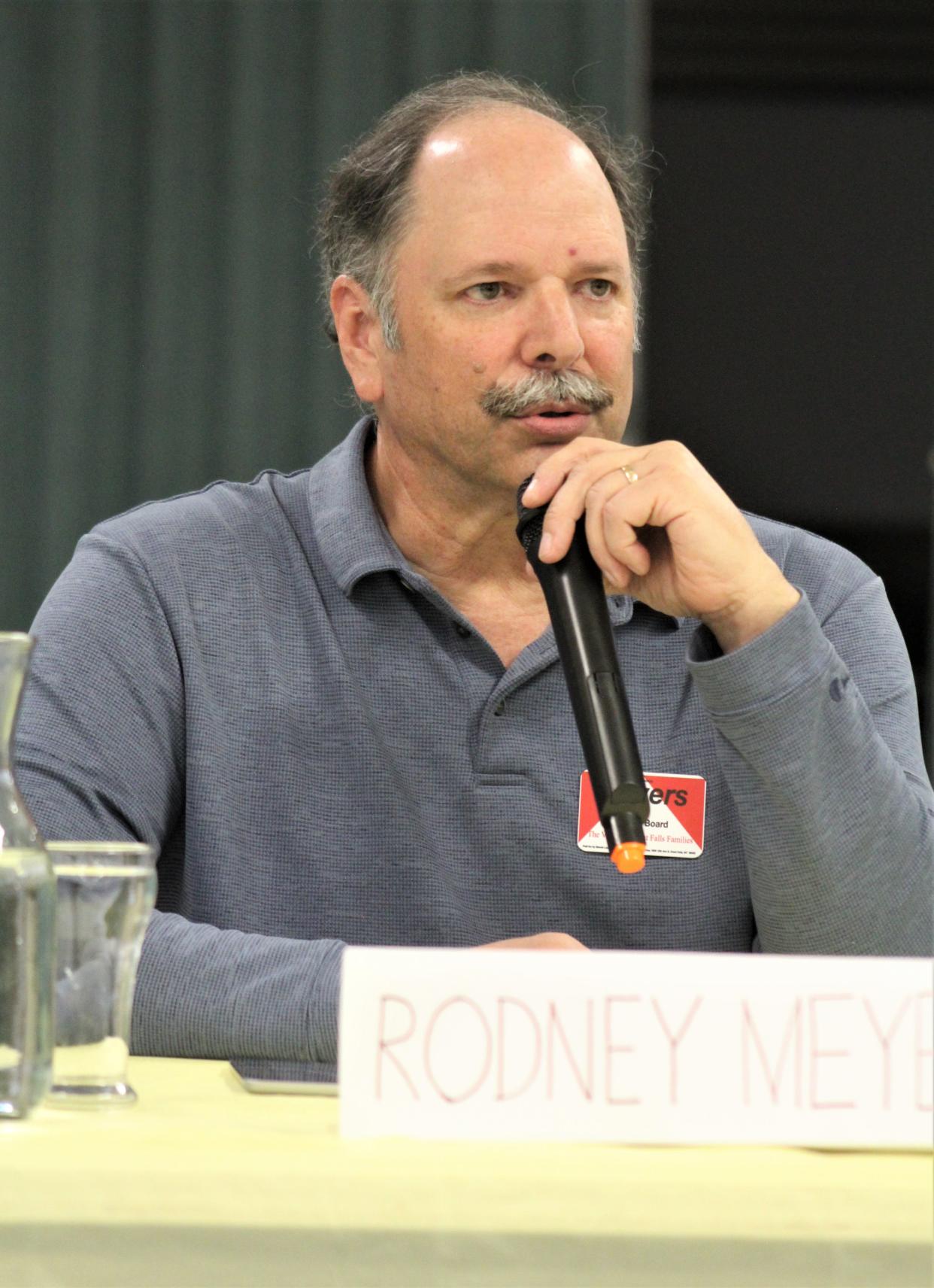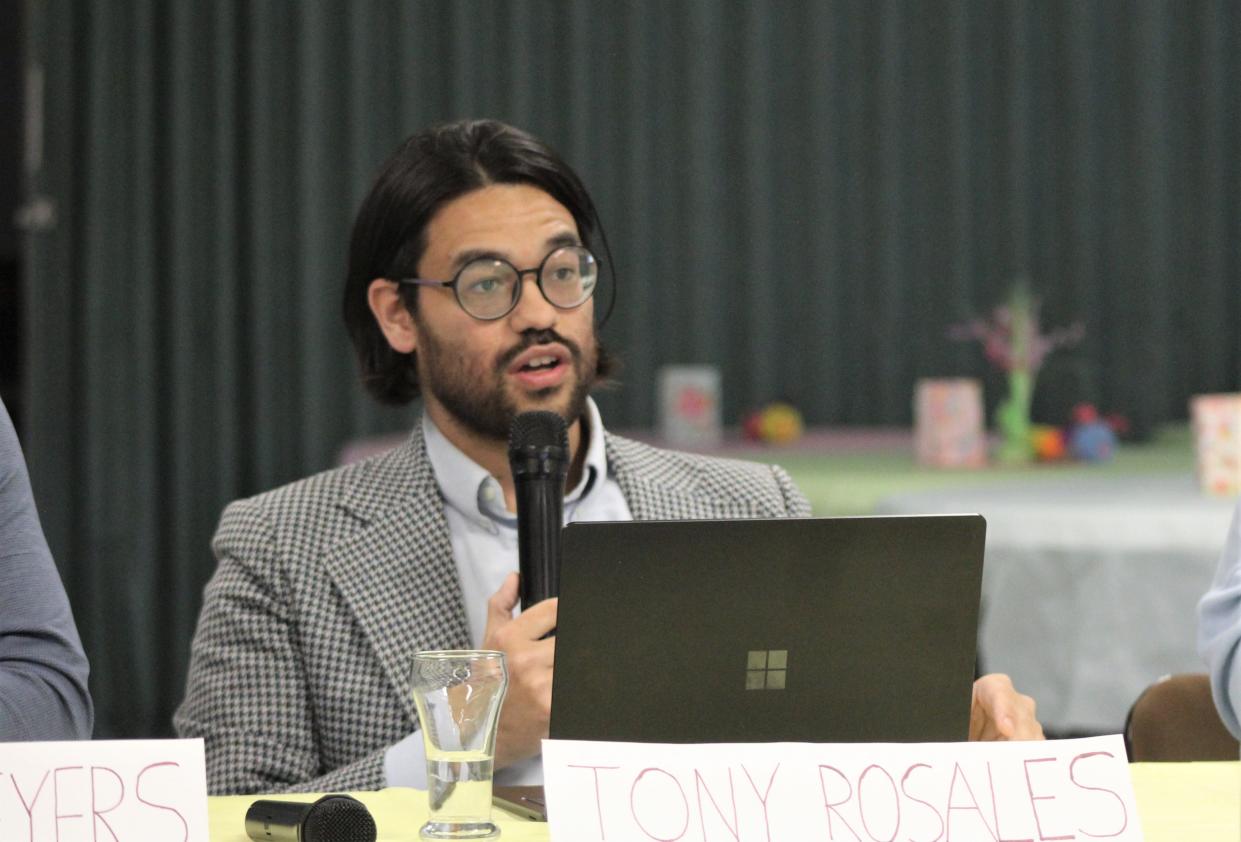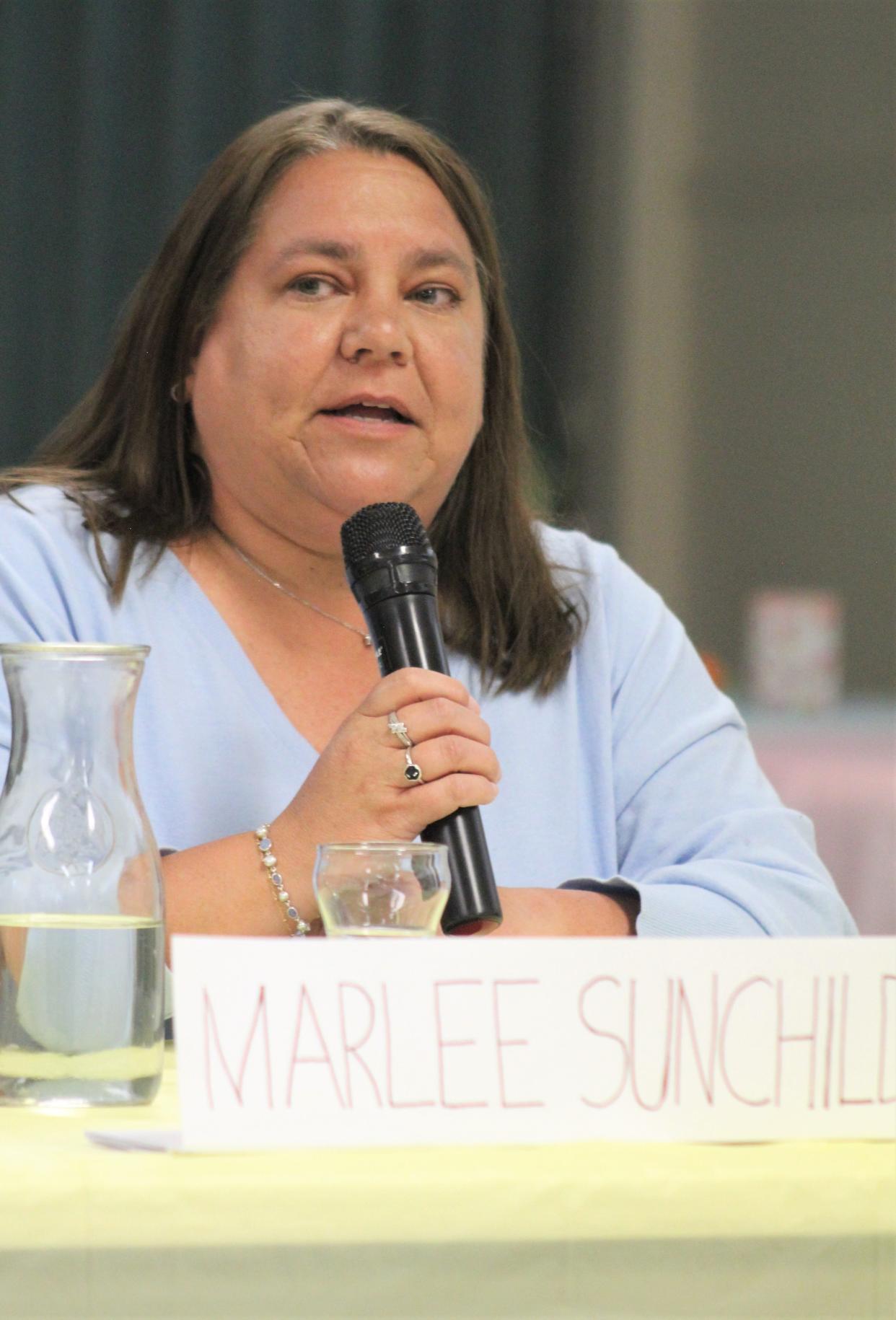Schools candidates answer questions at Tuesday's School Board forum

Approximately 40 people turned out Tuesday evening to hear the three candidates for this year’s Great Falls Public School District’s Board of Trustees answer important questions on curriculum, school funding, and teacher retention currently facing the school district.
Only one of the seven positions on GFPS’s Board of Trustees will be filled this year. The three candidates on the ballot for the May 7 election are Rodney Meyers, Tony Rosales and Marlee Sunchild.
Meyers, 62, graduated from Millersville University a with B.S. in computer science and currently works as a business systems manager. Meyers told the audience he’s been concerned about the education of our children for many years and has been attending most of the school board meetings for nearly three years.
“As a business systems manager in my professional life I am uniquely qualified to analyze how we go about the business of education,” he said.
Rosales, 31, is a graduate of the University of Notre Dame with a Ph. D in chemistry who currently works as a business management consultant. Rosales said that throughout his life he’s found inspiration to give back to his community though the life and words of his grandmother, who immigrated to the United States from the Philippines shortly after the end of World War II.
“I want to be able provide that inspiration to a lot of our youth … to come back and contribute to our own community that has helped us develop.”
Sunchild, 50, is the current incumbent for school board seat. She has 25 years teaching experience, and currently works as a legal secretary/receptionist. Sunchild said her decades long experience as an educator brings a unique perspective to the school board and makes her highly qualified for the position.
“I have a lot to offer and a lot to bring to this community,” she told the audience. “I know how schools run, and I know what teachers need, and I know what students need.”
School board candidates were each asked the same questions submitted by the public and given two minutes to answer. Due to the length of the forum and in the interest of being concise, not every response in its entirety is included in this story. A complete video of the forum will be uploaded onto the Great Falls Rising web site at https://greatfallsrisingmt.org/, where all answers in full may be viewed.
More: Great Falls School Board election ballots being sent out for May 7 election
The candidates were each asked the following questions:
What input do you feel parents should have in curriculum development?
Sunchild: “We really want parents to be involved. That’s our goal, for parents to be involved in our children’s education. However, the experts that we have hired because they have the education are the teachers, and that’s who needs to pick what is being taught.”
“We do not go to our doctors or our lawyers or mechanics and tell them how to fix our car, or how to get us out of legal trouble, or how to perform open heart surgery. We want parents to be involved because we want them to know what their children are learning. However, when it comes to choosing the curriculum, the standards, how lessons are presented – that’s for the experts, and our experts are our teachers.”

Meyers: “It’s always been my stance that parents should be choosing what is taught in our schools, and the teachers determine the best way how to teach that. How to teach what the parents have chosen. Parental input into the curriculum is paramount.
“The unfortunate side is that during the … curriculum reviews and selections that happened in the last couple of years fewer than 20 parents came to the school district office building to review the new curriculums. Parents need to step up.”
What would you hope to change about the public school curriculum and adoption process?
Rosales: “Right now we are following in the lead of a lot of universities when it comes to setting up courses and then deciding what sort of textbooks to use. There is a huge monopoly in Texas in those publishing companies, and their main goal is to make money – and right now our district is fine giving them that money instead of trying to figure out how do we develop curriculum in an honest, more cost-efficient way.”
“The different types of curriculum are out there, but instead we are deciding to spend thousands of dollars to publishing companies in Texas instead of keeping that money here to support some of the programs we need to.”
Sunchild: “There has to be continuity. You can’t have one third-grade teacher at Chief Joseph teaching one thing for math, and a third-grade teacher at Longfellow teaching another. You have to come up with a set curriculum that you have so that there’s continuity.”
“Part of this is because we have transient populations. When I taught at Longfellow those kids lived in a revolving door from school to school. There’re things you have to do and milestones you have to meet so that kids, when they move, aren’t missing large lessons and large skills – so there aren’t gaps because one teacher taught geometry in September but the other one is teaching it at a different time.”
Do you support school levies? If not, what innovative ideas can you offer to help with school funding issues?

Rosales: “What we see year-to-year when it comes to levies is that they have a hard time passing here in Great Falls. We as a school board need to realize that is that is not going to be our main mechanism to be able to fund things, especially when we’re in budget deficits. We need to be thinking about long term solutions and not these short-term budget cuts or short-term levies because they’re not going attack the issue of inflation that we get every single year.”
“We need to make sure we are working with the city when it comes to planning and development. We need to have families moving here and we’re not seeing that. We actually see families leaving Great Falls. Our funding for education is largely built around enrollment, so if we’re not addressing the growth in our communities then we’re going to continue to see enrollment drop.”
“The other thing we need to do is make sure we are turning toward our legislators and telling them, hey, we need the money that we told our communities we were going to give to education. That includes from cannabis and that includes from gambling.”
Meyers: “According to Montana Code Annotated, the District can only levy up to 20% of a set budget. We can’t just go out and say, hey, to fund fully next year we want a 10-mill increase. Even if everybody votes for it, we can’t do it. It’s state law. The challenge to the Board of Trustees is to make sure that the things being funded are specific to the activity of education. If we are not educating the students being entrusted to us, we have no business asking the community to provide funding."
"The other thing we do need to look at is the whole process of funding education in the state the way it has. We do need to be active in Helena during the legislative sessions in finding a better way to fund education in our state."
Can you give an example of a book that you would support or object to removing from the middle school library at the request of a parent, and why?

Sunchild: “There is no book that I would recommend removing from the library. We’ll just put that out there right now. We do have a committee and we have a process where if a parent comes to us with a concern, we will put it before that committee and we take all parents’ concerns very seriously.”
“However, when it comes to things like banning books, you’re taking away the students’ ability to critically think for themselves by removing that book and saying you’re not allowed to read that. You can’t critically think enough to decipher what that book is about. So, we take away a large part of education when you do that.”
"If a parent does have a concern, they can bring it to our committee. There’s 12 to 15 people on there. There is a process, and we will go through that process and take that seriously.”
Meyers: “I posed a situation to local law enforcement … and asked what would happen if I were to invite less than 18-year-old students into my house and read them the books in the library and show them the pictures, and they told their parents about it and the parents contacted law enforcement. I was told that given the specific book I referenced, which was in our library at that time, I would be contacted by law enforcement and would be prosecuted.”
“I do not think we should be exposing our teachers to the possibility of incarceration for doing their jobs. Nor do I think we should be exposing our children in our schools to that kind of literature - if you could call it literature. If parents want to expose their children to that in their own homes, that is their prerogative.”
“I would like us to run any book being brought into our libraries past a group of law enforcement folks including police, attorneys and judges, and if that group agrees that if a private citizen did so they would be incarcerated such a book would not be in our libraries.”
How important are programs like music, art, vocational education, family living or sports to the quality of education in our schools?
Meyers: “Music, art, and sports do provide life lessons that go on into the future and yes, some students will go on to make a living from music, art, and sports, but only a few. Yes, the do add to the quality of education from the perspective of keeping the students engaged and excited to be at school. The only hesitation in that answer is that we cannot say they are being successful because of how well their concerts go, and how good the art shows are, and how many state championships we have acquired if our students are not being educated.”
“Here's an analogy. If a school district produced cars, music, art, and sports are like air conditioning, cruise control, and autosteering. With a school performance where only 58% of our graduates are college or career ready, that would be the same that only 58% of cars run. Yes, we have air conditioning, cruise control, and autosteering, but 42% of the cars do not run are we being successful?”
“We need to focus on making the cars run first and foremost before we focus on the all the optional items.”
Rosales: “The amount that is actually spent for extra curricular programs is 2.15%, so the amount that we spend on some of these programs is pretty small, but I think the value that you get out of these programs is enormous.”
“I myself benefited from them. I was in band, I was in speech and debate, and I had plenty of other friends who were in sports. I think the skills that you get including the ability to work with others, the ability to handle conflict, your ability to critically think, and just the over-arching synapses that you’re forming with all the different programs provides better development than just simply education alone in the classroom.”
“Those two in concert with one another provide educational opportunities for some of our students that allows them to succeed and seek opportunii4es that probably were not going to be available to them unless they found them some other place.”
How can the GFPS School Board encourage hiring and retention of teachers?
Rosales: “Teachers understand that being able to get paid more is always going to be a struggle, but they also understand that there are so many other things they can do to feel supported to just be retained in the first place.”
“What it really comes down to is the culture that has been at the top of the school district that makes teachers feel supported, makes them feel like they have autonomy, and gives the professional development opportunities. Unless we’re allowing our teachers to grow, unless we’re allowing them to make the decisions instead of having a top-down approach in terms of you will do this in your classroom, we aren’t going to incentivize those teachers to stay and we’re going to continue to have this problem of retention.”
“In my first year of being a school board member I’m going to be doing comprehensive focus groups all across the schools to make sure I’m talking with students, families, teachers, staff and the rest of the community to understand what are our specific needs. No one has gone into the classroom robustly and figured out what are teachers saying that they need for better support.”
Sunchild: “The easiest solution would be to pay our teachers more, but we can’t get blood from a turnip. We can’t do that. Every single person on this board cares about teachers. I cannot tell you how much we talk about the teachers and what we can do for the teachers. We do know that they need to be supported in the classroom. We know that they need to feel heard, they need to be feel seen.”
“We need to make the community feel welcoming to new teachers and to new families. We need to make this a place where people want to make their homes. We want the means to make teachers want to come here, but then they need to stay. It can’t just be something where the school board gets them donuts every other Friday.”
“It’s a giant problem and we need to come together as a community. Let’s make this a community where people want to live, where they can afford to live, where there’s housing they can afford, where there’s jobs, where we welcome teachers, we support education and we’re not always fighting our school district and pointing out our wrong doings. That’s one of the biggest things that will help attract teachers and keep teachers. Make them feel supported in this community and make them feel valued.”
This article originally appeared on Great Falls Tribune: Great Falls schools candidates meet votes in forum before May 7 vote
